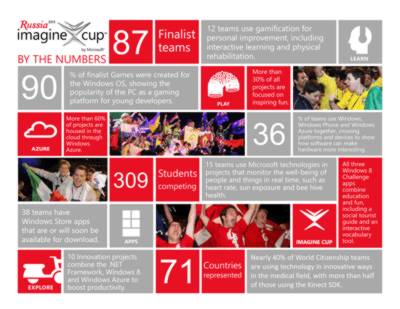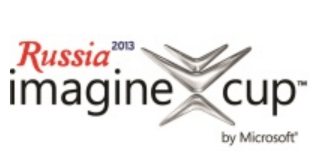| Imagine Cup 2013 Gives Way To 2014 |
| Written by Sue Gee | |||
| Sunday, 21 July 2013 | |||
|
This month's Worldwide Finals of the Imagine Cup was the 11th annual staging of Microsoft's student competition. Over the time it has visited countries around the world. Next year the event will be "going home" to Microsoft's Redmond headquarters in Seattle, USA.
(click on graphic to open larger version in new window)
The culmination of the 4-day event in St. Petersburg was an Awards Ceremony held at the historic Alexandrinsky Theater. The Russian National Ballet provided the floor show and Matt Smith, the latest incarnation of Dr Who, took on the role of Host to welcome the students. He first introduced Microsoft VP Steve Guggenheimer who described Microsoft as a student run startup pointing out that Bill Gates and Paul Allen started out when they were high school students and that Steve Ballmer was "a guy they recruited while they were at Harvard". Guggenheimer explained that the idea behind the Imagine Cup was to drive innovation and creativity by providing students with the tools they needed and using the competition to show what they could achieve. He had been very impressed with the combination of technology with business acumen showcased in this year's event. Reminding the audience of the importance of the support they received from teachers and professors, the first awards went not the students but to five of the mentors who had assisted the student teams. Next on the stage Nikolay Pryanishnikov, President of Microsoft Russia, told the audience that Russia is very different and has a lot of peculiarities. He gave some statistics to illustrate Russia's "IT-fix": it has the biggest Internet population in Europe, 2nd usage in the world of social networks and Skype, and a list of Russia's important IT companies. He also revealed an important Imagine Cup statistic - this year participation in Russia increased by a factor of three with 3,000 students taking part. He then introduced Nikolai Nikiforov the youngest minister in the Russian government, who addressed the audience in English and Russian. The final preliminary speaker was Andrey Egorov CEO of the Open University of Skolkovo who talked about support for startups. After more ballet, Matt Smith returned to the stage and prizes began to be awarded, starting with those from Russia's main internet company. The Mail.Ru Group Connected Planet Award recognized projects that embrace online communication and entertainment in fun, useful and innovative ways: • First Place, $10,000 Prize: Team Y-Nots, India, Project: Zoik It! • Second Place, $5,000 Prize: Team TeamNameException, Italy, Project: Ulixes • Third Place, $3,000 Prize: Team LetssGo, China, Project: Get & Put These are all projects we've covered in our previous reports on the Imagine Cup main competition and challenge winners, but other third-party awards were made to projects that hadn't won multiple prizes.
First place ($12,000) in the Women’s Empowerment Award, which in partnership with UN Women, recognized projects that best address issues impacting women globally went to Team Code 8 from Uganda, for Matibabu, a Windows Phone Application that diagnoses for malaria using a custom piece of hardware (matiscope) which avoids requiring a blood sample. The second prize of $8,000 went to Team Omni-Hearing Solution, Taiwan which also came second in the World Citizenship competition for its project to overcome hearing loss. Other special awards were not cash prizes. Team AYNi from Ecuador won the Facebook Creativity Award for its volunteering social-network based project and took home $25,000 in Facebook advertising credits. Team Flying Ship from Brazil won the AppCampus Award of a four-week AppCampus training event in Finland with 50,000 euros in funding, airfare and accommodation for Callvenient, an app that knows when you can’t be interrupted and handles your incoming calls made by phone or Skype, helping people find the best times to contact you. The five teams that won the AFT Excellence Award for outstanding Windows 8 Apps projects and will receive AFT (App Fast Track) review by the Windows Team are:
Looking at the geographical distribution of all the winners the area of the world that is conspicuously absent this year is the United States. Perhaps bringing the competition "home" to Microsoft's own city of Seattle, as announced via video by Steve Ballmer at the end of the awards ceremony, will spur on US student teams in the 2014 competition. The new season launches at the end of August.
More InformationRelated ArticlesDr Who To Host Imagine Cup Awards Ceremony UK, Portugal and Austria Win Top Awards at Imagine Cup 2013 Singapore, India and Italy Top In Imagine Cup Challenges Imagine Cup 2013 - Finalists Announced Imagine Cup 2013 - With Bigger Prizes New Imagine Cup Competitions With a Focus on Women The Imagine Cup, Grants, Education and Careers
To be informed about new articles on I Programmer, install the I Programmer Toolbar, subscribe to the RSS feed, follow us on, Twitter, Facebook, Google+ or Linkedin, or sign up for our weekly newsletter.
|
|||
| Last Updated ( Sunday, 21 July 2013 ) |




